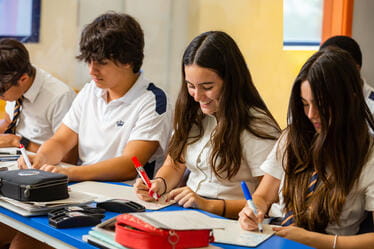We use cookies to improve your online experiences. To learn more and choose your cookies options, please refer to our cookie policy.


Year 11 is a testing time for students, teachers, and parents. For our students, the previously elusive IGCSE exams were a glimmer on the horizon. The realisation that the mock exams are in 24 weeks has been something of a shock to the system for many. Add this to the serious and complicated nature of the PSHE sessions in the past weeks, the Y11 pastoral team wanted to try to relieve some of the growing pressure and stress.
School isn’t just about what is taught and learnt in the classroom, so first up was a ‘friendly’ teamworking competition between 11A and 11B. On a beautiful Monday morning, they were taken outside and told they couldn’t speak (not for the first time…). They were then challenged to line-up from eldest to youngest. Cue a wild amount of frantic gesticulation and frustration not seen since the last Italy vs Brazil football match. With some confusion (admittedly generated by the teachers) both groups managed to complete the task in relatively quick time. Task 2 proved to be the most fun and painful looking! The Human Knot. As can be seen from the pictures, the students had to grab hands and then follow instructions to untie themselves. This led to some yelps of surprise and moments of ingenuity, such as going for a birds-eye view.


After forming positions that Yoga instructors would be proud of, they managed to untie themselves, only to be met with the challenge of defeating the teachers at Rock, Paper Scissors, a game not of luck but skill…Then teamwork to solves some riddles, which included classic riddles that the Sphinx would have been proud of:
What is always in front of you but can’t be seen?
The more there is, the less you see. What is it?
If you’ve got me, you want to share me; if you share me, you haven’t kept me. What am I?
Once these mysteries were unravelled, a race to the library to unearth some hidden secrets buried with books began. Upon completion a footrace to the form room for celebrations and commiserations began. It was close, well, geologically speaking anyway, but 11A triumphed but 11B could be proud of their efforts. House points for all!
This week saw the next stage in the support being put in place for our students. A visit was arranged from a psychologist who helps and works with young adults and the issues that they face. She visited the Y11s and delivered a session on adolescence and mental health, in English, which I am sure contained food for thought for all present.


She covered the big three topics of stress, sleep and eating and exercise, providing a few ideas to cope with situations and positive messages to help. After answering some student generated questions, she led us in a guided breathing and meditation exercise to help reduce stress and anxiety.
One of the purposes of the PSHE time is not only educating ourselves, but also learning and honing skills. If we look at the IB Learner Profiles, we can see where our students have already started to embrace and display some of these qualities, be it communicating in the middle of a pile of contorted teammates, taking risks by being a part of the knot, or being knowledgeable and inquiring to solve riddles. My favourite display however is around the Caring Learner Profile. I overheard a student asking their friend, “Are you ok?”, then following up with “If you’re not, that’s ok but I’m here if you need me”. I think this is just a slice of the quality of young adults we have in Y11 and hopefully how they know they are being supported both in and out of the classroom.
